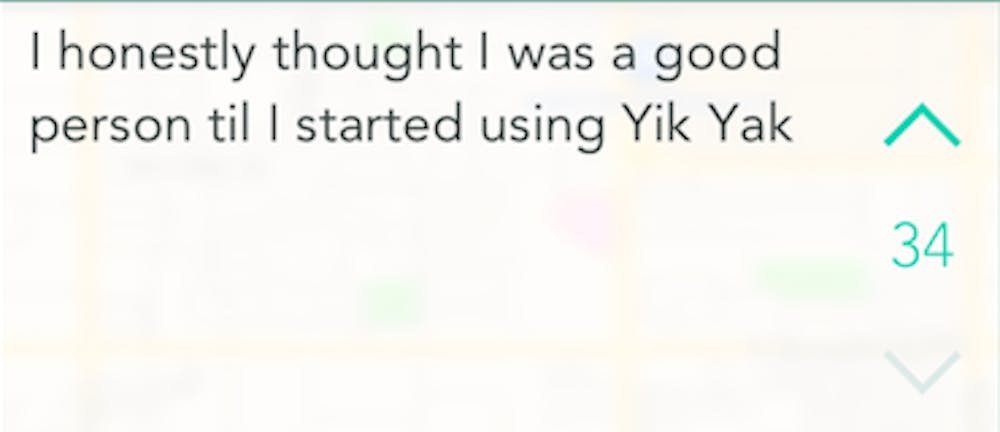Time and time again we are reminded to think twice before posting something on the Internet. Even from our personal accounts, we have the responsibility of upholding a positive representation of our on-campus organizations, our jobs, our school, yada, yada, yada—the list goes on and on. Well, one mobile application decided to eliminate that responsibility.
Yik Yak is an anonymous, location-based social media app that provides a live feed of user-submitted comments. For obvious reasons, users are not permitted to share photos, and any comment that receives a certain amount of down votes will be removed.
I wanted to know more about this app, so I went ahead and searched it on Google. Instead of being immediately directed to the site, I found a variety of recent news headlines regarding the app.


What was intended to be an outlet for students to anonymously share thoughts without fearing judgment has turned into a medium for cyber bullying, death threats, and questionable morals.
At the end of the day, Yik Yak is causing more trouble than it’s worth. We know by now that anonymity on the Internet is a dangerous thing, so why continue creating new mediums for doing so? Websites like 4Chan, Imgur and Reddit are all anonymous content sharing sites that connect like-minded people who, as we saw with the celebrity iCloud hackings, do not always have good intentions. The ability to say whatever you want without having any degree of accountability for it brings out a scary side of humanity.
After downloading the app, I found myself dumbfounded about what to post. What did I want to say now that I didn’t feel comfortable posting on social media previously? Did anyone really care what I just ate for lunch? Or was I supposed to share a transcendentalist moment of my own among a live feed of fraternity trash-talking and underage students trying to score alcohol? No, Yik Yak isn’t the right place to do any of that.
Today, so many people talk about the psychological danger of building an online personality for yourself on social media that doesn’t match up with who you really are, but sometimes we forget that it can be even more dangerous to have no online identity at all. No one is held accountable for what they say, which brings out an immature side of some users that they should have outgrown by now. Yik Yak is taking its users in the wrong direction.

Supporters of Yik Yak defend the app by saying it is a means for freedom of speech, but in retrospect freedom of speech means the right to communicate your opinion without fear of retaliation. In that case, you should be expressing your freedom of speech conspicuously.
Anonymity on the Internet has its pros, but what was Yik Yak really expecting to come out of directing this app at college students? The only thing keeping a portion of us civil on other social platforms is that our comments are directly associated with our identities.
Maybe somewhere, a fantasy world exists where Yik Yak users discuss current events, share motivational stories, and cheer one another up; but until we find that place, let’s be real—Yik Yak is nothing but trouble.
Reach the columnist at ralynch3@asu.edu or follow him on Twitter @ryguy916
Editor’s note: The opinions presented in this column are the author’s and do not imply any endorsement from The State Press or its editors.
Want to join the conversation? Send an email to opiniondesk.statepress@gmail.com. Keep letters under 300 words and be sure to include your university affiliation. Anonymity will not be granted.
LikeThe State Presson Facebook and follow@statepresson Twitter.








